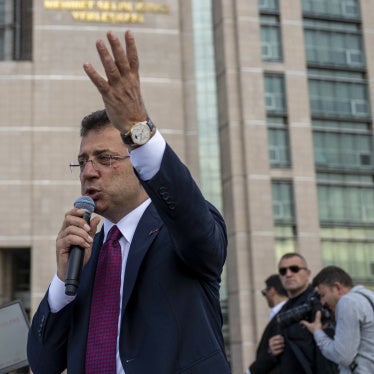(New York) - The Russian government should closely examine evidence gathered by the Austrian government which indicates the president of Chechnya, Ramzan Kadyrov, ordered the kidnapping last year of a Chechen refugee in Vienna, Human Rights Watch said today. The refugee, Umar Israilov, died as a result of gunshot wounds inflicted by his assailants.
On April 27, 2010, the Austrian prosecutor's office announced that, following a year-long investigation into Israilov's murder, the country's federal counterterrorism agency had concluded that Israilov had been killed as a result of a botched kidnapping, which was allegedly ordered by Kadyrov. All three suspected kidnappers are in custody in Austria, awaiting indictment by the prosecutor's office. Kadyrov has denied any involvement in the crime.
"Suspicions have been swirling around this case from the very beginning," said Holly Cartner, Europe and Central Asia director at Human Rights Watch. "Now Austria has concluded a substantial investigation, with findings that deserve Russia's most serious scrutiny - and response."
Israilov, 27, was shot dead on January 13, 2009, as he left a grocery store in Vienna. In the years prior to his murder, he had stated publicly that he had been tortured by Kadyrov and had named Kadyrov in a case he had brought before the European Court of Human Rights.
An article that appeared in The New York Times immediately after the killing said that Israilov had been detained in 2003 in Chechnya as a rebel fighter, was amnestied, and then briefly served as a bodyguard for Kadyrov. The article cited an interview with Israilov in which he said that during his detention Kadyrov had tortured him, including using electric shocks. He was also quoted as saying that he had witnessed beating, kicking, and other torture of detainees by Kadyrov and his subordinates.
According to The New York Times, in 2008 Israilov said that "an emissary from Mr. Kadyrov had arranged meetings with him and demanded that he drop his legal complaints and return to Chechnya. The man threatened Mr. Israilov's family." Several days prior to the killing, Israilov complained to Austrian police authorities that he was being followed by unknown individuals.
"Umar Israilov directly accused the Chechen president of torture, and this seems to have made him a target," Cartner said. "Sadly, this is only one of a number of killings of brave individuals who have spoken up about abuses in Chechnya that seem to have a clear political motivation."
Human Rights Watch has documented persistent abuses, including ill-treatment and torture, by Chechen law enforcement and security agencies under the de facto control of Ramzan Kadyrov, who act with rampant impunity. Victims of rights violations and human rights defenders who seek to hold perpetrators to account have been threatened, abducted, and even killed.
On July 15 2009, the most prominent Chechen human rights activist, Natalia Estemirova, was abducted in Chechnya and murdered. Estemirova worked on some of the most sensitive human rights cases for the Memorial Human Rights Center. The circumstances of her murder, along with a pattern of threats against her, Memorial, and independent activists and journalists in Chechnya, all point to possible official involvement or acquiescence in her murder.
In August 2008, another alleged victim of torture in Chechnya, Mokhmadsalakh Masaev, was abducted in Chechnya several weeks after the publication of an interview in which he described his torture and illegal detention in a secret prison allegedly run by Kadyrov in his home village. To date, Masaev's fate and whereabouts remain unknown.
"The conclusions reached by the Austrian Prosecutor's office about Ramzan Kadyrov have turned the spotlight on his governance," Cartner said. "They should prompt the Russian government to finally take the necessary steps to restore the rule of law in Chechnya."






